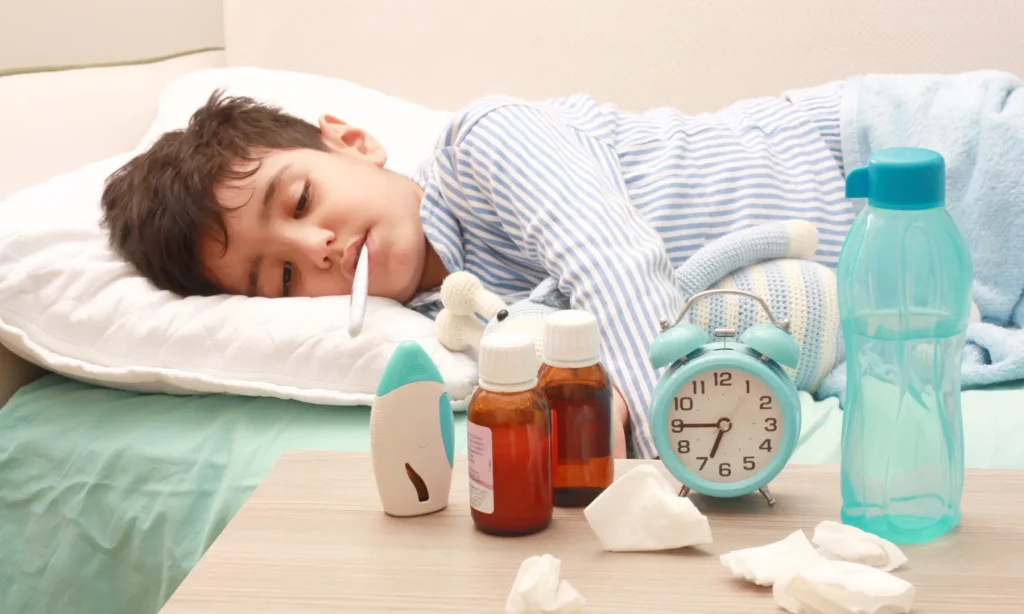Have you ever noticed how stress or even a simple cold seems to make everything feel worse? For those dealing with tics, it’s not just an inconvenience—it can feel like their signs are magnified overnight, leaving you wondering why and what you can do about it.
Tics and illness can take on a whole new level of unpredictability. Is it the body’s immune response? The added fatigue? Or something more profound, like the connection between the brain and the gut? Understanding how illness impacts tics can empower you to find ways to help your child feel supported and resilient, even when life throws curveballs.
Key Takeaways
-
Illness triggers tic flares through immune system activation. When children get sick, their immune systems release inflammatory molecules called cytokines that cross into the brain and overstimulate the neural pathways controlling tics, creating a “glutamate storm” that makes existing tics worse and can introduce new ones.
-
Multiple hidden factors beyond illness can worsen tics – Food sensitivities (especially gluten, dairy, and artificial dyes), gut health imbalances, heavy metal toxicity, nutrient deficiencies, and chemical exposures create chronic inflammation that keeps the nervous system hyperexcited and tic-prone.
-
Functional medicine addresses root causes, not just symptoms. Unlike traditional approaches that focus on suppressing tics, functional medicine investigates underlying triggers like gut bacteria imbalances, toxic loads, and nutrient deficiencies to build long-term nervous system resilience.
-
Immediate illness support focuses on reducing inflammation. During acute illness, parents can help calm tic flares through proper hydration, anti-inflammatory foods like ginger and turmeric, essential oil diffusion, and prioritizing restorative sleep to clear inflammatory debris from the brain.
-
Long-term tic management requires a comprehensive approach. Successful tic reduction involves tracking trigger patterns, extensive testing for gut health and nutrient levels, eliminating inflammatory foods, working with functional medicine practitioners, and building resilience through sleep optimization, stress management, and movement.
Table of Contents
Why Do Tics Worsen When Your Child Is Sick?
If you’ve noticed your child’s tics seem to flare up every time they catch a bug, you’re not imagining things. Here’s why this happens—and how the domino effect of sickness, stress, and the immune system might be at play.
1. The Immune System Gets Fired Up
When your child is sick, their immune system works overtime to fight off the virus or bacteria. This immune response causes inflammation, which doesn’t just stay in one place—it can affect the whole body, including the brain. Inflammation may irritate parts of the brain tied to motor control, which could ramp up tics.
2. Inflammation and the Brain’s Signals
Think of inflammation as static interfering with a radio signal. It makes it harder for the brain to get its messages across smoothly. For kids with tics, this can mean their usual brain-body coordination gets disrupted, leading to more frequent or intense tics.
3. Fatigue Takes a Toll
Sickness is exhausting. When your child is worn out, their nervous system may struggle to cope with the day-to-day challenges of managing tics. Lack of sleep or general fatigue acts like gasoline on the fire, making everything feel amplified.
4. The Stress Loop
A sick child often feels stressed—how could they not? Coughing all night, experiencing body aches, or missing favorite activities can be frustrating. Stress has a direct impact on tics, often triggering or worsening them. It’s a vicious cycle: stress fuels tics, and tics create more stress.
5. Neurological Responses to Illness
Have you heard of PANS/PANDAS? These conditions reveal an intense connection between illnesses, neurological responses, and tics. Though rare, some children experience a sudden surge in tics, OCD-like behaviors, or other signs after certain infections, like strep throat. If this sounds familiar, you might want to explore this connection with a healthcare professional.
6. The Gut-Brain Link
The gut might play a bigger role in all of this than you’d expect. Illness can throw your child’s gut health off balance—cue the probiotics commercial vibes—which, in turn, messes with the gut-brain axis. Since the gut and brain “chat” through nerves and chemical signals, an irritated gut might stir up neurological signs, including tics.
Pro Tip: Keep an indicator diary when your child gets sick. Jot down their tics, the illness they had, and anything else unusual. Patterns might emerge over time, giving you clues to manage future flare-ups better.
So, next time your child’s tics hit turbo mode during a cold, remember it’s not a random occurrence—it’s their body reacting to a perfect storm of factors. Understanding these links can help you feel less alone and better equipped to handle the ups and downs.

The Science Behind Why Tics Worsen with Illness
While they’re fighting off the flu, a cold, or even strep throat, their immune system can unintentionally trigger tic symptoms. Let’s break it down so it all makes sense.
Immune Activation and Inflammation
Think of your child’s immune system as a response team fighting viruses or bacteria using signals called cytokines. While these help fight infection, they also cause inflammation, which can spread to the brain areas controlling movement. This can make tics worsen, especially during fevers or illnesses. To help, track when tics spike and link them to diseases in a notebook or app. Over time, patterns can guide you in managing future flare-ups effectively.
Cytokines and the Brain: The Glutamate Storm
When cytokines reach the brain during illness, they activate immune cells called microglial cells. These cells can overreact, causing a “glutamate storm.” Glutamate, a helpful brain chemical, can overwhelm the brain when levels are too high, interfering with the calming neurotransmitter GABA. This imbalance can lead to more frequent tics. Processed foods high in unbound glutamate, like flavored chips or canned soups, can worsen this issue, so opting for fresh, whole foods may help, especially when your child is sick.
Supporting Research
Research backs this up, linking immune overactivation and glutamate levels to neurological conditions like tics, autism, and Tourette’s. Some standout studies include:
-
Zheng et al., 2016*: Found that high blood glutamate levels were common across disorders impacting the brain, including autism spectrum conditions, suggesting systemic imbalances.
-
Stanford University Medical Center, 2017**: Highlighted how disruptions between calming and excitatory brain chemicals, like GABA and glutamate, could worsen signs.
-
Rojas, 2014***: Explored treatments aimed at glutamate receptor antagonists, which showed potential in reducing neurological imbalances for some conditions.
Research offers hope by uncovering the causes of tic spikes, enabling effective strategies like monitoring inflammation, trying dietary changes, and staying updated on scientific findings. These insights empower families to manage tics confidently.
How to Calm the Storm: Functional Medicine Solutions for Tics and Illness
When your child’s tics flare during an illness, it can feel like fighting the wind in a storm—unpredictable and overwhelming. Functional medicine, which dives into underlying causes, offers tailored, natural ways to calm these rough moments and bring steadier days ahead.
Immediate Support During Illness
Keeping your child comfortable and supported during an illness is the first step. Their body’s immune system is like an overzealous security guard, fighting off germs but sometimes causing unintended side effects, like intensified tics. To soothe this overdrive:
-
Hydrate, hydrate, hydrate. Dehydration stresses the system, so offer water, mild broths, or even watered-down fruit juices (but nothing too sugary). A fun water bottle with their favorite design might encourage sipping throughout the day.
-
Soothe inflammation naturally. Simple remedies from your pantry, like warm ginger tea, can calm irritated systems. Slice fresh ginger into hot water and add a touch of honey. Turmeric powder mixed with honey (as a paste) can also work wonders for immune support.
-
Try essential oils sparingly. If your child’s comfortable with gentle scents, diffusing peppermint or lavender oil in their room may reduce stress and tension.
-
Boost comfort with easy swaps. Cozy blankets, adjustable lighting, and a chilled washcloth on the forehead can make them feel nurtured, even when they’re feeling crummy. Little comforts go a long way!
Illness can throw your child’s body off balance, so your job isn’t about perfection, just taking small, comforting steps each day.
Long-Term Strategies for Tic Reduction
Managing tics isn’t a sprint—it’s a winding trail. Functional medicine helps you peek under the hood, identifying what might be fueling those tics and gently addressing the underlying issues. Here’s the long game:
-
Fix the gut-brain connection. Have you heard of leaky gut? It’s where the digestive lining weakens, letting bad stuff (toxins, undigested food bits) sneak into the bloodstream, potentially amping up neuroinflammation. Introducing probiotics (think yogurt or specific supplements) and gut-friendly foods—hello, bone broth—can start repairing that lining.
-
Fill in nutrient gaps. Common deficiencies like magnesium, zinc, and Vitamin B6 play a huge role in stabilizing the nervous system. Kids need these like cars need gas! You may want to work with a practitioner to find high-quality supplements that’ll genuinely make a difference.
-
Address hidden stressors. Toxins, like mold hiding in your home (yep, that stubborn green patch in the bathroom corner), or heavy metals in water, could be stealth culprits. Testing air or water quality at home might reveal what’s lurking.
-
Reframe stress for emotional boosts. Kids (and let’s be real, adults too) thrive with stress-busting habits. Simple mindfulness techniques like breath counting or progressive muscle relaxation might calm them—no fancy equipment needed, just some quiet moments.
If you’ve already tried the “obvious” routes, like magnesium or diet tweaks, but still feel stuck, don’t be discouraged. Your child’s health puzzle may just have more layers to unpack carefully and methodically.

A Functional Medicine Plan: Your Next Step Toward Healing
When you’re exploring the swirling storm of tics, PANS/PANDAS, or Tourette’s, it can feel like you’re constantly playing whack-a-mole with signs—one flares up just as another quiets down. A Functional Medicine Plan offers a map to find the “why” behind those signs. It’s less about masking and more about solving the mystery, step by step. Here’s how you can get started:
1. Track Triggers like a Detective
Getting to the root of what’s intensifying your child’s tics starts with a trusty indicator journal. Does screen time ramp up tics? What about after eating certain foods like candy or processed snacks? Jotting down patterns can help pinpoint triggers. Awareness is the first step toward adjustments!
2. Get the Right Testing
This isn’t your average blood test kind of thing. Functional medicine digs deeper, looking at gut health, nutrient levels, and even environmental toxic load. For instance, did you know low magnesium levels are often linked with tic flare-ups? Or could food sensitivities be contributing to these signs? Testing opens doors to tailored solutions instead of guesswork.
3. Clean Up the Diet (Gently!)
Before you panic, this isn’t about banning every favorite food at the dinner table. But cutting back on processed meals, added sugars, and sneaky glutamates (common in instant noodles and snacks) can work wonders. Fill plates with whole, unprocessed foods like roasted veggies, lean proteins, and fruit. One small change at a time makes a world of difference!
4. Work With a Functional Medicine Practitioner
You wouldn’t try to fix your car engine with DIY YouTube videos alone, right? A functional medicine expert on tics, such as Dr. Piper Gibson, can customize a plan for your child, focusing on their unique body chemistry. Maybe it’s adding zinc and vitamin B6 supplements or tackling mold exposure in your house. Their expertise turns random puzzle pieces into a clear picture.
5. Rebuild Resilience
This isn’t just about diet or supplements—it’s about creating balance across the board using a holistic approach. Prioritize sleep by setting wind-down routines with cozy lighting and storytime. Reduce stress by incorporating mindfulness, such as bedtime breathing exercises. Encourage movement—short walks as a family can double as bonding time. And don’t underestimate the power of connection with friends or family; laughter truly is medicine.
When you start breaking it all down, this plan doesn’t feel overwhelming. It’s more like putting one foot in front of the other with your child right there beside you, every step of the way.
Final Thoughts: Empowering Parents with Knowledge
Understanding the connection between illness and tics is an opportunity to take proactive steps. By recognizing potential triggers and embracing a functional medicine approach, you can better support your child’s well-being during challenging times.
Every child’s journey with tics is unique, and there’s no one-size-fits-all solution. Trust your instincts, stay curious, and don’t hesitate to seek guidance from professionals who can help uncover the root causes. With patience and persistence, you’re building a foundation for long-term health and resilience—not just for your child but for your entire family.
If you are ready to dig deeper into your child’s tic disorder, click here and start with the Tic Disorder Cheat Sheet.
Frequently Asked Questions
Illness can worsen tics by triggering inflammation that affects motor control areas in the brain. Fatigue, stress, and gut health disruptions during sickness can also exacerbate symptoms by impairing the nervous system’s ability to regulate tics effectively.
Parents can keep their child comfortable, ensure proper hydration, and use natural remedies like ginger tea or turmeric to reduce inflammation. Keeping a journal of tic patterns during illness can help identify triggers and inform future management strategies.
The gut-brain connection plays a significant role in tic management. Illness can disrupt gut health, leading to increased inflammation and impaired communication between the gut and brain, which may intensify tics.
es, tics can often be managed through holistic strategies like dietary adjustments, mindfulness, addressing nutrient deficiencies, improving gut health, and reducing environmental stressors. These approaches aim to support overall well-being rather than just masking symptoms.
PANS (Pediatric Acute-onset Neuropsychiatric Syndrome) and PANDAS (Pediatric Autoimmune Neuropsychiatric Disorders Associated with Streptococcal infections) are conditions where infections trigger sudden increases in tics and OCD-like behaviors. Early diagnosis and treatment are crucial for management.
Parents can start by tracking tic triggers using a journal, testing for nutrient deficiencies and gut health issues, making gradual dietary changes, and working with a functional medicine practitioner to develop a tailored plan that builds resilience and supports overall health.
References
- *Zheng, Z., Zhu, T., Qu, Y., & Mu, D. (2016). Blood Glutamate Levels in Autism Spectrum Disorder: A Systematic Review and Meta-Analysis. PloS one, 11(7), e0158688. https://doi.org/10.1371/journal.pone.0158688
- **Stanford University Medical Center. (2017). Autism May Reflect Excitation-Inhibition Imbalance In Brain. ScienceDaily. Retrieved October 21, 2020 from www.sciencedaily.com/releases/2017/08/170802152544.htm
- ***Rojas, D. (2014). The Role of Glutamate and its Receptors in Autism and the Use of Glutamate Receptor Antagonists in Treatment. Journal of Neural Transmission, 121(8), 891–905. https://doi.org/10.1007/s00702-014-1216-0
- Purcell, A., Jeon, O., Zimmerman, A., Blue, M., Pevsner, J. (2001). Postmortem Brain Abnormalities of the Glutamate Neurotransmitter System in Autism. Neurology, 57(9). https://doi.org/10.1212/WNL.57.9.1618

